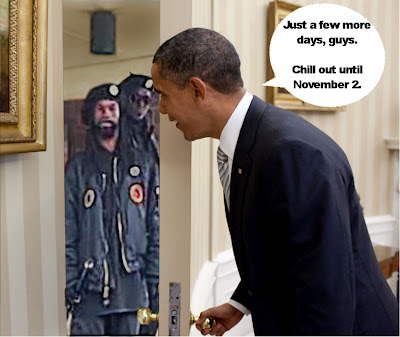Do Republicans in Congress have the courage to deny Obama his choice for Justice? Expect a lot of liberal demagoguery this year and we must listen to what our Republican candidates say on this. Already Trump has indicated he will not fight for a Constitutional judge. The Tunnel Dweller.
Newsmax

. . . "President Barack Obama was informed of Scalia’s death Saturday afternoon, and his lame-duck status triggered immediate calls by Republicans to defer the nomination of a new justice until the next president’s term begins in 2017.
"Known for his sarcasm and combative style, Scalia was a polarizing force on the court and across the country. He called the 2015 decision that legalized gay marriage a “threat to American democracy,” said a 1992 abortion-rights opinion “cannot be taken seriously,” and predicted a 2008 ruling favoring Guantanamo Bay inmates “will almost certainly cause more Americans to be killed.”
Scathing Dissents: "In 2002, Scalia blasted a decision that invoked the constitutional ban on cruel and unusual punishment to bar executions of mentally disabled killers. “Seldom has an opinion of this court rested so obviously upon nothing but the personal views of its members,” Scalia said in his dissent." . . .
Justice Scalia, Political Philosopher and Political Football . . . "In a sense, Cruz and Rubio must speak for the very thing Scalia dedicated his life to: replacing the gut-level right-wing instincts of earlier brands of judicial conservatism with a philosophy in which ideas had consequences, means mattered as much as ends, and We The People was more than just the handy slogan of the demagogue." . . .
Supreme Court Justice Antonin Scalia, RIP. . . . "Scalia’s death leaves a vacancy on the court. The court can operate with eight justices, but any decisions that result in a 4-4 split among the justices leave the lower court decision unchanged:
WaPo: Antonin Scalia and the Fortas Precedent "My Twitter feed is filled with Democrats loudly protesting that despite statements to the contrary by Senate Republican leaders, Senate Republicans wouldn’t dare to refuse to confirm a suitably qualified Supreme Court nominee in a presidential election year. I suspect they would dare, partly because the “base” would go nuts if they did otherwise, and partly because President Lyndon Johnson’s failed 1968 nomination of Abe Fortas to be Chief Justice provides a close enough analogy that it would be difficult to accuse the Senate GOP of acting in an unprecedented obstructionist manner." . . .

Newsmax
| I'd say the left is rejoicing right now. TD |
"Known for his sarcasm and combative style, Scalia was a polarizing force on the court and across the country. He called the 2015 decision that legalized gay marriage a “threat to American democracy,” said a 1992 abortion-rights opinion “cannot be taken seriously,” and predicted a 2008 ruling favoring Guantanamo Bay inmates “will almost certainly cause more Americans to be killed.”
Scathing Dissents: "In 2002, Scalia blasted a decision that invoked the constitutional ban on cruel and unusual punishment to bar executions of mentally disabled killers. “Seldom has an opinion of this court rested so obviously upon nothing but the personal views of its members,” Scalia said in his dissent." . . .
Justice Scalia, Political Philosopher and Political Football . . . "In a sense, Cruz and Rubio must speak for the very thing Scalia dedicated his life to: replacing the gut-level right-wing instincts of earlier brands of judicial conservatism with a philosophy in which ideas had consequences, means mattered as much as ends, and We The People was more than just the handy slogan of the demagogue." . . .
Supreme Court Justice Antonin Scalia, RIP. . . . "Scalia’s death leaves a vacancy on the court. The court can operate with eight justices, but any decisions that result in a 4-4 split among the justices leave the lower court decision unchanged:
Although rare, 4-4 ties are hardly unheard-of—justices do recuse themselves from time to time. A split decision effectively upholds the ruling of the lower court (presumably a state supreme court). In the event of such a tie, the court typically issues what’s known as a per curiam decision. The opinion in such a decision is issued under the court’s name, as opposed to consisting of a majority and a minority opinion. Justices, however, may attach dissenting opinions to the per curiam decision if they like—as happened in Bush v. Gore. When a 4-4 deadlock does occur, the case is not deemed to have set any sort of precedent. Tradition holds that the court’s per curiam opinion in such ties is usually very, very terse, often consisting of no more than a single sentence: “The judgment is affirmed by an equally divided court.' ” . . .. . . "Ed Whelan, among others, argues that the Republican Senate should not confirm an Obama nominee."
WaPo: Antonin Scalia and the Fortas Precedent "My Twitter feed is filled with Democrats loudly protesting that despite statements to the contrary by Senate Republican leaders, Senate Republicans wouldn’t dare to refuse to confirm a suitably qualified Supreme Court nominee in a presidential election year. I suspect they would dare, partly because the “base” would go nuts if they did otherwise, and partly because President Lyndon Johnson’s failed 1968 nomination of Abe Fortas to be Chief Justice provides a close enough analogy that it would be difficult to accuse the Senate GOP of acting in an unprecedented obstructionist manner." . . .


